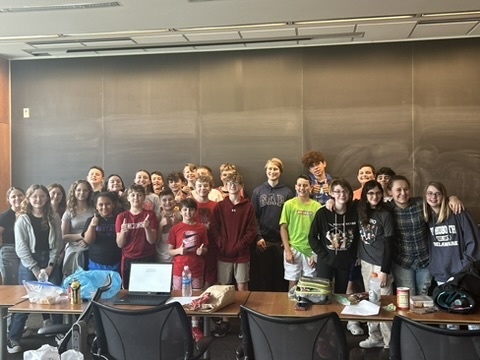CMU HCII Research Partnership with Laurel Highlands Middle School Culminates in Exciting Campus Visit
By Sofia Baybekova
Throughout the 2023-2024 academic year, students from Laurel Highlands Middle School participated in Carnegie Mellon University’s Human-Computer Interaction Institute’s (HCII) study on AI-based mobile tutoring software titled "Optimizing AI-Based Tutoring Software for Middle-School Mathematics on Smartphones”. Dr. Vincent Aleven is the head of the study, with collaborators Dr. Ken Koedinger, Dr. Paulo Carvalho, and Jonathan Sewall, as well as Conrad Borchers, Ph.D. candidate. On Friday, May 17th, Laurel Highlands Middle School students from Zachary Hixson's math classes visited CMU to celebrate the end of their participation in the research. The visit was a collaborative effort between the Simon Initiative K-12 coordinator and the research team in HCII. During the visit, students got to tour CMU’s AI Makerspace and TechSpark and hear talks from Dr. Paulo Carvalho, a Systems Scientist in the HCII, and Conrad Borchers, HCII Ph.D. candidate.
The study is part of a multi-year research project grant sponsored by the Institute of Education Sciences (IES), aimed at studying favorable conditions for middle school math homework and related practice. While participating in the study, Laurel Highlands students used the AI-based tutoring software as an integral part of their daily math practice. The tutoring software was designed using learning units from Mathtutor, HCII's extensive web-based tutoring system. The spring semester study portion aimed to evaluate updates and optimizations made to the software based on the data from previous students. Students used the units as normal, and the researchers could see if they were interacting with the updated or control system to determine if the updates impacted student learning outcomes. While both versions helped Laurel Highlands students learn and improved overall math outcomes, the researchers were interested in seeing if one was more effective and efficient than the other.
During their visit to CMU’s AI Makerspace, students interacted with an extensive assortment of robots and participated in hands-on robotics programming and manipulation. AI Makerspace Manager Greg Armstrong and CMU’s Robotics Institute Project Leader Michelle Hyde shared with the students about advances in AI technology and robotics.
Following the AI Makerspace visit, students heard a presentation from Conrad Borchers, Ph.D. candidate. Borchers coordinated data collection during the study and was the main contact for the study as the students participated throughout the spring. In his presentation, Borchers told the students about his academic background and shared his inspiration for studying human-computer interaction and pursuing a PhD.
After his talk, he let the students preview another AI-based tutoring software. In this version, the students used their mobile devices and took on the role of caregiver and child while performing the simulation in groups of two. This upcoming phase of the research investigates the possible impact of motivation and hints provided by caregivers on students' learning. When asked if they preferred this model to traditional paper math homework, most excitedly said, “Yes!”
Next, Dr. Paulo Carvalho gave an in-depth presentation on the meaning of human-computer interaction and a summary of his academic and professional journey. Many of the students were very surprised to learn how much of our everyday lives are composed of interacting with computers in concealed ways. Dr. Carvalho stressed the importance of humans not only knowing how to communicate with a computer but also computers knowing how to communicate with humans. Dr. Carvalho is grateful for the opportunity to have students from Laurel Highlands participate in the research study. Participation from students and their teachers is an invaluable part of conducting educational studies.
The day concluded with a visit to CMU’s TechSpark, where Machine Shop Manager Ed Wojciechowski gave the students an exciting tour of the space. Wojciechowski showed the students all the equipment available for use within TechSpark, such as 3D printers, laser cutters, power tools, sewing machines, and woodworking tools, while also stressing the importance of safety measures when working in the space.
The visit was a great conclusion to the students’ participation in CMU research this spring. Dr. Carvalho and the team are excited to work with more students as they continue to investigate ways to build better math practice in and out of the classroom. You can learn more about CMU’s intelligent tutoring systems by visiting the Mathtutor website and trying Mathtutor tutoring software units 7.05 and 7.06 on Graph Interpretation and Plotting. The study is actively recruiting schools for further portions of the research.
If you are a K-12 educator interested in participating in CMU research or organizing a visit to CMU for your school or students, please contact Lindsay Forman, K-12 Coordinator at CMU’s Simon Initiative.


